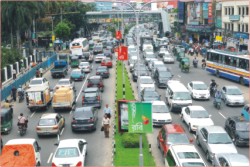Opinion
Beating the Traffic Jams of Dhaka
Asrar Chowdhury
 |
Photo: Yamin Tauseef Jahangir |
Traffic jams are a part of our everyday lives in Dhaka. In the absence of reliable data, it is safe to say we spend at least two hours every day sitting in a vehicle trapped and locked with no choice but to sit and do nothing. Newspapers write about jams. Intellectuals and policy makers constantly search for a way out. May be in the future things will improve. At the moment there's no hope but to sit and 'watch the wheels (not) go round and round' unlike the John Lennon song in Double Fantasy, 1980.
Economic theory teaches us resources are limited. We try to make the best use of our limited resources from the scarcity we face. A common scarcity all economic agents face is time. Time is limited to 24 hours a day for everybody. The cost of time spent in jams is the opportunity we forego in work that could have been achieved if jams had not existed. Traffic jams would have been a lost cause twenty or more years ago. In the 21st century technology has given us the scope to be at two places at the same time with the Internet- the best Christmas present given for free to mankind by Tim Berners Lee its creator in 1990.
No reason to underestimate Bangladeshis. Who would have thought this country could be a lucrative market for mobile telecommunication? And it is. And through the internet and mobile telecommunication it is possible to beat the traffic jams of Dhaka and defy the age-old concept of opportunity cost in economics textbooks. Look at your mobile phone. It's no longer a phone. It's a gadget. Captain James T Kirk will be dwarfed in asking Scotty to 'beam him up' to Starship Enterprise if he came to visit Bangladesh. The solution to traffic jams lies in mobile phones and through the internet.
Today everybody who is anybody probably has a mobile phone with which they can get into the internet highway. Why not socialise through Facebook and Twitter? Read newspapers, browse Wikipedia to out fool your contemporaries, and of course Google is always there to guide you anywhere. When you think about it, you can optimise your jam time with the internet.
If you are old fashioned and love the smell and feel of paper- then books and printed newspapers are always there. Developing a reading habit will not only help you beat the jams of Dhaka, it will also keep your brain working. Thinking- isn't that what students and teachers are supposed to do? Look at the Londoners. They have one of the best underground and over ground transportation system in the world. And yet they also spend hours commuting from point A to point B. But you will see most of them reading or browsing or social networking with their mobile phones and iPads and Tablet PCs.
Still not happy? Don't want to tire and strain your eyes? Great. Then why not listen to music? Don't forget. The mobile phone is a gadget. Plug in the earphone and transport yourself into a world of imagination while the transport around you stands still.
Optimisation may not always be good. Some economic theorists have good grounds to make this claim. Optimisation certainly is good to beat the traffic jam that has become a part of our lives. Time is scarce. You have to make the best use of whatever time you get. Time runs through your fingers like sand. You can only hold it totally only once it's gone. Al Stewart's 1978 'Timeless Skies' reminds us this. It also reminds us we have the technology and traditional means at our disposal to make time move when everything else around is still.
Technology or no technology let's beat the traffic jams of Dhaka. Let's get back to the good old days of Dacca when the city was a town. Imagination is still the most powerful weapon humans have. Until a solution does evolve- which it will today or tomorrow- let's be optimisers with an optimistic mood and maximise whatever idle time we lose in the ubiquitous jams of Dhaka.
(The writer teaches economic theory in the departments of economics at Jahangirnagar University and North South University)
| 